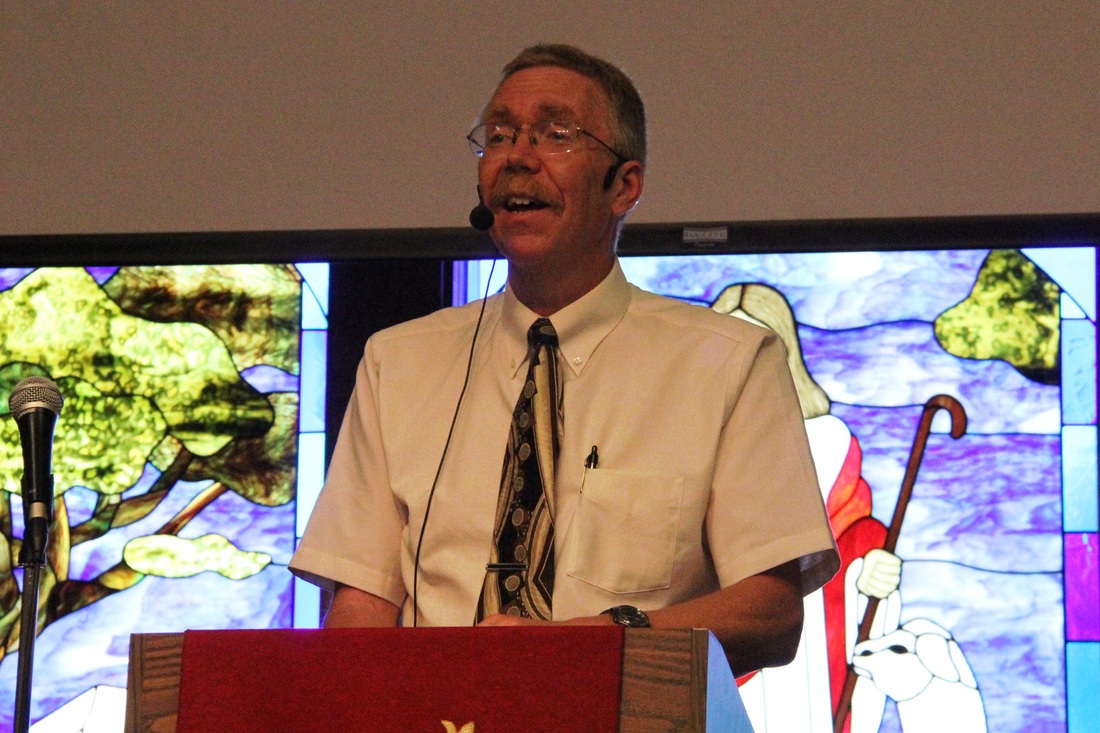
Is. 53 is reality check of faith in Jesus Christ. Isaiah is like the realist father laying out all the details of what car ownership means/laying out the fullness of accepting Jesus Christ, the surprising Savior. Isaiah 53 presents challenges for those who are considering Christ. The prophet Isaiah is saying to the people: A messiah/Christ (hero!) is coming to redeem you ~ let me tell you about him because he is surprising ~ He is misunderstood, He will suffer, He will not defend himself, He will be silent, He will die. Is that the description of a hero? YES, but a hero of a different kind.

Is. 53:1-3 a misunderstood savior (READ) “Who has believed our message?” is the question. The answer: Few people! Jesus came as the Messiah but Israel wanted nothing to do with him. Today there are many who want to reduce him to a wise teacher, an example of peaceful demonstration. When Jesus came to earth, for a time he had a growing ministry. Thousands flocked to hear him speak and heal the sick. Many followed for shallow reasons. Some thought he would proclaim himself king and lead a revolt against Rome. Some liked his miracles. Some were drawn to his teaching. Multitudes turned back when confronted with the call to become his followers. At one point Jesus asked his inner circle, “Will you also go away?” (John 6:67).
The leaders of Jesus day, with few exceptions, wanted nothing to do with him. They accused him of being in league with the devil (Matthew 12:22-24). They hated him so much they plotted to kill him. John says it this way: “He came to that which was his own, but his own did not receive him” (John 1:11). They did not receive him … they did not believe him. Finally, they crucified him.
The next verse explains why Jesus is judged insignificant. He came from a common background. “He grew up before him like a tender shoot, and like a root out of dry ground” (Is. 53:2). The phrase “tender shoot” means he was a little plant that people look at as if it were a weed, if they noticed it at all. An annoyance that you pull and toss aside because it will never amount to anything. Jesus was not impressive!
When God decided to enter the world, he came in a most unlikely way. He came not as a conqueror or a world leader but as a helpless little baby, born in a stable, in the little village of Bethlehem. Insignificant. Years later his critics dismissed him by asking, “Is this not the carpenter’s son?” (Matthew 13:55)….
Jesus had an ordinary appearance. READ Is. 53:2b. We have our image in America: flowing hair, well trimmed beard, piercing eyes, with a soft glowing light that seems to radiate from his face. Nobody really knows….
Sometimes preachers, based on this verse, declare Jesus was in reality ugly ~ in my view, this verse is describing Jesus as he hung on the cross because in the next verse it describes the crucifixion. READ Is. 53:2b-3. The situation described by Isaiah is like going to visit somebody you know in ICU after a major surgery with all the tubes, bruises, swelling. Isaiah is pointing to the repulsion of the cross.
I am forever indebted to Chaplain Manley. When I was in school I did a hospital internship. Chaplain Manley exposed us to as many situations as possible, accident victims, cancer, a premature birth. Chaplain Manley told us interns: “Most of you will not be chaplains, you will be pastors and missionaries. I want to expose you to these hard situations to face them here with strangers, so that someday when you face them with people you know, you will be able to look past the wounds and see the people. I have learned to look past the wounds, past the sin, past the ugliness, and see the people.
When you look at the cross suffering is real. Most people had no use for him ~ “he was despised and rejected” i.e. Jesus was a loser. To follow Christ is not to deny the reality of the cross, the pain, the suffering, but to see the fullness of Christ including the pain. We are called to look past the wounds. For most people, Jesus is not the right sort of Messiah (READ Is. 53:3c). Twice in verse 3 Isaiah reminds us that people “despised” our Lord. They saw his suffering, and determined he could not be the promised Messiah. “We esteemed him not” = “He’s a nobody to us.”
Jesus is truly the misunderstood Messiah. His own people misread him. The more he proved he didn’t belong in that box, the more they counted him a nobody.
In the next verses it gets personal. Isaiah describes a suffering substitute. Notice how often Isaiah uses “our” “we” and “us.” READ Is. 53:4-6. “Our griefs” ~ “Our sorrows” ~ “We esteemed him” ~ “Our transgressions” ~ “Our iniquities” ~ His chastisement “brought us peace” ~ “With his wounds we are healed” ~ “We . . . have gone astray” ~ “We have turned” ~ “The iniquities of us all"
I love the story by Os Guinness: In one of their periodic efforts to eradicate religious belief in the Soviet Union, the Communist Party sent KGB agents to the nation’s churches on a Sunday morning. One agent was struck by the deep devotion of an elderly woman who was kissing the feet of a life-size carving of Christ on the cross. “Babushka [Grandmother],” he said. “Are you also prepared to kiss the feet of the beloved general secretary of our great Communist Party?”
“Why, of course,” came the immediate reply. “But only if you crucify him first.”
No other God has wounds. Nothing in this scripture makes sense until you feel the full weight of this truth: Jesus suffered and died for you. It’s personal.
The pain and brutality of the cross was for you and me. I am amazed how much of the world wants to accept Jesus as a wise teacher, a peaceful protester ~ it’s all true, BUT, if you reject the core truth that Jesus Christ died for your sins on the cross taking your place in death, then you reject Jesus Christ. Jesus is a miracle worker, He answers prayer, He is wise beyond the wisdom of the world, but the central truth explaining the fullness of Christ: he died for me.
He Took Our Pain. READ Is. 53:4. Isaiah begins with our pain and sorrow. Sin and our guilt come later. The text says Christ has “bore” our sufferings, like the scapegoat who carried away the sins of the nation in Lev. 16. Jesus came to lift the heavy burden of sadness brought about by our sin and the pain of living in a sinful world.
One person said it this way (C. Smith): He took up our infirmities and carried our sorrow. That must include the division in your family, the loss of your job, the death of your husband, and the pain of your past. In Christ…we find a God who drew near to us, who came to us, who entered our world and became one of us, that he might carry our sorrows for us. Your pain will not have the last word. Your sorrows will not last forever. Jesus has borne our grief and carried our sorrows. This teaching is similar to Matt. 11:29 when Jesus says, “Take my yoke upon you.”
Jesus Took Our Punishment (READ Is. 53:5) pierced with a spear, crushed, No other God has wounds. But Jesus death did not fail. There are two amazing results in Is. 53:5b:
- Peace with God. wholeness. In a messed-up world filled with broken people and broken promises, through Christ we have peace that passes all understanding.
- We are healed. We are healed from our guilt, hatred, doubt, and shame. Through Christ broken people are put back together again.
Jesus Took Our Place (READ Is. 53:6). This is the gospel. We have all sinned/gone astray, turned to our own way. We are all in the same boat and the boat is sinking. God laid our sins on Jesus. That’s substitution. That’s the heart of gospel. Jesus took my place when he died. God laid my sins on him.
One more surprise: Is. 53:7-9 the Silent Savior READ. Jesus was silent. Submissive. He did not fight his death sentence. He did not defend himself. Why was Jesus silent? It’s not because he was guilty. Is. 53:9 says there was no violence or deceit about him. The answer for why Jesus was silent is the answer that causes us pain, an answer that is difficult for some to accept, yet so simple to understand.
Jesus was silent, not because he could not defend himself. He was silent because he could not defend you and me. Jesus died for our guilt. There is no defense. No excuses. No declaration of innocence. Because of my sin, Jesus chose to die, so he remained silent. He was given an unjust sentence: “assigned a grave with the wicked” in Is. 53:9. No violence, no deceit the scripture says, nothing for him to deserve. Jesus died. Cut off from the living. Stricken. Assigned a grave. Jesus silently took my place in death because that is the plan of God to ready you and me for salvation.
Jesus is a surprising savior. Is. 53 is a reality check. Only the Christian God is wounded. You are invited to reach out with the empty hands of faith and trust in Christ as your Lord and Savior. The door to salvation is marked, “For Sinners Only.” Jesus died so that sinners like you and me could be saved. God’s call for us today: “‘Come now, let us reason together,’ says the LORD. ‘Though your sins are like scarlet, they shall be as white as snow’” (Isaiah 1:18). Here is God’s promise to those who come by faith: “the blood of Jesus, his Son, purifies us from all sin” (1 John 1:7).
Reality check: you cannot save yourself. Reality check: Jesus loves us so much he was willing to die. He is our substitute. He was silent because he would not and could not defend us. The only thing for us is to believe in him. Turn from your sin, lay down your self-will, and lay hold of the Son of God who loves you and died for you. If you trust in him with all your heart, he will not turn you away. Amen.


 RSS Feed
RSS Feed